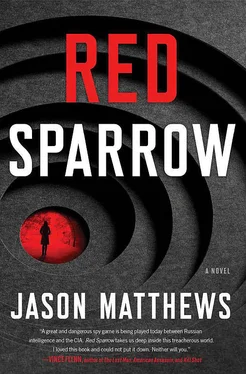They varied the days and the nights, and the screaming interrogations, and sometimes they strapped her flat on the stainless steel tables. It didn’t matter whether she was upright or whether her head hung down over the edge of the table. Dominika resisted with all her strength, all her will. It wasn’t hatred, because that would be too brittle. She cultivated disdain, she wouldn’t succumb to these beasts, she refused to let them exert their will on her.
They didn’t look smart enough to find all the nerve bundles—at the base of the coccyx, or above the elbow, or on the soles of her feet—but the light, questing fingers never missed, and the screaming pains rocketed up her body into her head, and she heard her own ragged breath in her throat.
The nerve pain was different from the tendon pain, which was different from the pain of a cable tie cinched tight around her head, across her open mouth. Dominika found that the anticipation of pain, waiting for what was next, was worse than the agonies they could generate. The glob of conductive lanolin slathered between her buttocks scared her more than the first nudge of the rounded aluminum peg they pushed into her, scared her more than feeling the electrical current, the bitter, pulsing pain, involuntary, back-arching pain, that left her limp when the current stopped.
One female jailer indulged in personal sport while conducting official business. Her strong hands and thick wrists were splotched by vitiligo, they lacked pigment. Strapped to a steel-and-canvas chair, Dominika watched the pinkish hands scuttle endlessly over her body, pressing, squeezing, pinching. The matron’s eyes—they were oval like a cat’s—watched Dominika’s face. One Appaloosa hand lingered low on Dominika’s belly, and the matron’s lips parted unconsciously in agitation.
The matron leaned close—her face was inches from Dominika’s, her eyes questing, looking for revulsion, or terror, or panic. Dominika kept her face still and looked back into the darting eyes, then opened her thighs.
“Go ahead, garpiya, harpy,” whispered Dominika in her face. “Go ahead and wet your sleeve.”
The matron straightened and slapped Dominika across the cheek. Sorry to ruin your soggy little game, Dominika thought.
The crickets clicked and she was shoved, thumping against the back of the cabinets at the ends of the corridors, and the lights stayed on in the cell until she could feel the sand under her eyelids, and the screeching hailer sounded like Schumann or Schubert, she couldn’t tell which. A sallow girl with bruises on her legs and a crusted sore in the corner of her mouth was thrown into her cell, face-first onto the floor, and she wanted to talk all night, a frightened cellmate sobbing about how she hated them, she hadn’t done anything wrong. The little yellow-winged kanarejka, the canary, wanted a friend. The girl licked the sore on her mouth and looked at Dominika on her cot and put her hand out and whispered she was lonely. Dominika turned her face to the wall and ignored the raspy voice.
They didn’t know anything. They were looking for something to come adrift, something to pull on, but she held on tight to her secrets. They came back to the Americans, they wanted to know about her assignment to get close to Nash. Did you fuck him? Did you wrap your little Sparrow beak around his khuy ? Every day there would be two hours without the straps, or the screaming, or the slaps across the face that brought her head left and right and blurred her vision. A nameless colonel—in formal uniform with powder-blue shoulder boards that matched his halo, sensitive like Forsyth, an artist—sat across a table. She had to be careful with him, stay alert.
He spoke quietly, evenly, at the start of each session asking why she had betrayed her country. She replied she had done no such thing, and he continued as if not hearing her, asking mildly what were the reasons she had decided to do it, what was the exact point in time that she had decided.
The colonel was so mild, so assured in his manner. His questions were drawn from a premise—her guilt—that began to become a reality. Let us talk about life’s disappointments, he would say, those disappointments that compelled you to do these things. Logic and fantasy and misstatements all began to invade her exhausted mind. Would you like to read the transcripts of Sinyavsky’s trial? She didn’t know who that was, a dissident, in 1966. Read how denial evolves into acceptance, how it can liberate, said the colonel. His voice was soft, modulated, his blue bubble seemed to envelope her. Stay awake.
The ancient, poisonous, and dispassionate transcripts mesmerized her; it was as if she were physically present during the show trial. She felt herself slipping. The wearisome act of denying individual accusations brought her closer to agreeing with the colonel’s overarching assumption of her guilt. It was simple, really, he said, they simply had to establish how she had strayed, when, and how badly.
He almost broke her, the moderate colonel in his pressed uniform, but she refused to be drawn down into their black hole. Her name was Dominika Egorova. She was a ballerina, an officer in the SVR, a Sparrow trained to bend others’ minds. She loved and was loved in return. She closed her eyes and flew high above Moscow, tracing the river, high above the fields and the forests, and dipped her wings over Butovo and the slit trench that held the body of Marta Yelenova, the ground frozen solid above her.
Marta gave her strength and she wrenched her mind back from the abyss, she retreated inside herself, used everything they gave her to resist them, including the hallucinations, Dominika welcomed them. She lay in her cell and it was the bed in Helsinki, and the hot light in her eyes was the Finnish moonlight, and she lay still and felt him on top of her. The fever and the chills were his caresses. Her infected eye shed tears of love, which he kissed away. She turned on the mattress, her fists bunched under her stomach to stop the ache.
Even as her arms went numb from the straps, she felt herself getting stronger. She touched the secret inside her, it had been buried deep, but she could feel it again. The secret that lived in her soul, the secret that she had stuffed away out of their reach, was rekindled, began to burn again. She could think about it, knowing they could not get their hands on it. Her mother had told her Resist, Fight, Survive. They were getting weaker, she was getting stronger. Their individual colors were stuttering on and off, as if a fuse were loose.
She told them, kept telling them, she did not do anything wrong, she couldn’t tell them anything because there was nothing to tell. The louder they screamed, the happier she became. Yes, happy—she loved these men and women who tormented her, she loved the turquoise-painted colonel. They knew they could not keep on indefinitely, they were running out of time. Unless they forced a confession, they had nothing.
=====
Far above the crenellated roof of Lefortovo and Lubyanka and Yasenevo the ether was filled with sly messages, queries and responses, precedence and deadlines. Information was coming out of Washington about the Bullard affair. The Washington rezidentura had its feelers out, contacts were being taken to lunch, cooperative Americans were being met in underground garages, or on the C&O Canal Towpath, or on darkened cobblestoned streets in Georgetown or Alexandria. A rumor circulating out of the US Justice Department held that Bullard had been under suspicion for a year before he contacted Russian intelligence in Helsinki. His arrest in Washington had been planned, but his unexpected travel abroad had forced their hand.
Читать дальше












